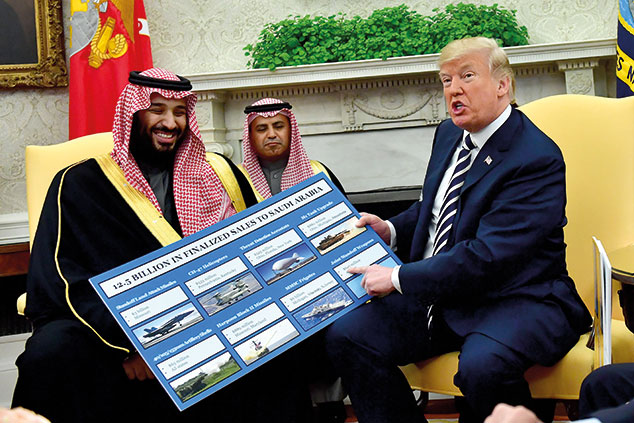
“As popularised by President Trump, social media is a very recent vehicle for announcements by political leaders,” says The Times. “It has now generated a diplomatic stand-off between two allies of the United States.”
Last week Canada’s foreign minister, Chrystia Freeland, posted a message on Twitter calling for the release of two imprisoned Saudi human-rights activists, Raif and Samar Badawi, who are the husband and sister-in-law of Canadian citizens. The Saudi government “responded with a fierce denunciation of the supposed intrusion on its sovereignty”, expelled the Canadian ambassador, withdrew its own ambassador to Ottawa, suspended new trade and investment, and made plans to withdraw Saudi students and hospital patients from Canada.
Not just a face-saving spat
Riyadh may have overreacted, but its behaviour needs to be seen in the context of the wider social and economic reforms that are taking place in the kingdom, says
Ali Shihabi in The New York Times. Given the power of the clerical establishment, and others opposing the changes, it is vital Riyadh is not seen to be acting as “a result of Western political pressure, but rather in the interests of the country, the people, their faith and their culture”.
So King Salman and Crown Prince Mohammed bin Salman “cannot allow outsiders to try and dictate their views to the kingdom’s leadership or attempt to reach out directly to the Saudi people in such matters”.
Nonsense, says Nesrine Malik in The Guardian. “Up until now there has been a broadly agreed-upon protocol governing how Saudi Arabia’s allies criticise the country, and how Saudi Arabia reacts.” This limits any Saudi response to token “face-saving” measures.
However, Saudi Arabia now “seems to be acting with an enhanced sense of entitlement, demanding that even cosmetic expressions of concern about human rights cease”. This new stance reflects the “volatile” temperament of the “easily slighted” crown prince, who is now in charge. Under his purview, the kingdom “has been involved in spats with Canada, Germany and Sweden, and embroiled itself in conflict with Yemen, Qatar and Lebanon”.
Canada stands alone
Don’t expect any country to take Canada’s side in this dispute, says Sahar al-Faifi in The Independent. After all, “for decades, Saudi Arabia has been one of the world’s largest purchasers of arms, maintaining a flow of tens of billions of dollars to Western countries, including the UK, US, Canada and Germany”.
Naturally, these purchases come with a catch as “they expect this money to buy silence: we’ll pay for arms we don’t need, and in exchange you’ll keep your mouths shut about our human-rights violations”. This means “whether it’s bombing Yemen or jailing women’s rights campaigners”, the Saudi government is counting on Western acquiescence and “world governments turning a blind eye”.
Indeed, many Europeans have already learned the hard way that the new Saudi government won’t tolerate criticism, says Judy Dempsey in the Financial Times. “Berlin had its fingers burnt last year when Sigmar Gabriel, the former foreign minister, criticised Saudi Arabia’s ‘adventurism’ in Lebanon and Yemen”, for example.
Since then, “Daimler, Siemens, Deutsche Bank and other companies have been cold-shouldered by Riyadh”. It’s therefore disappointing, but not surprising, that “instead of standing up for Canada, Europe backed away from a Nato ally and a country that recently forged a major trade deal with the EU”, while Britain has merely “urged restraint” on both sides.